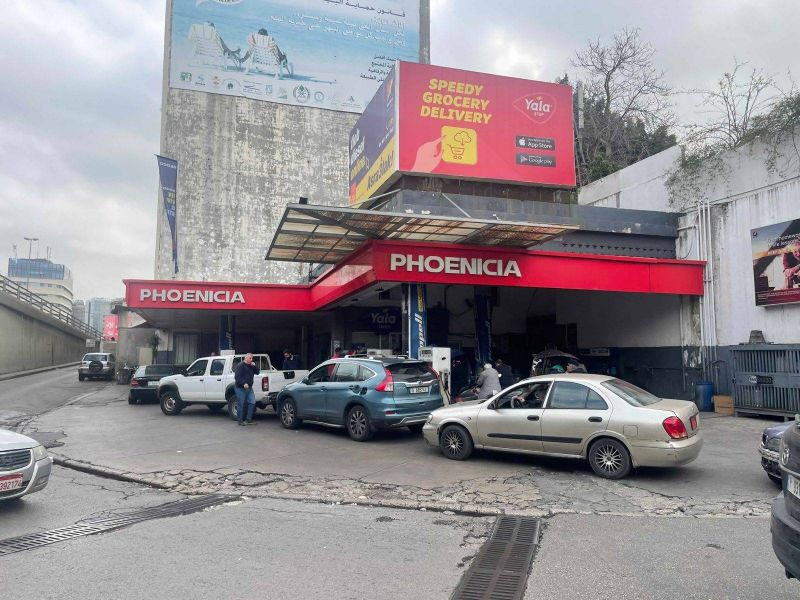
Drivers line up at a gas station in central Beirut on March 7, 2021. (Credit: Kim Makhlouf/L'Orient Today)
BEIRUT — A line of people waiting to fill up their cars with fuel this morning at the Medco gas station in Baabda was longer than it had been in months. Global oil prices have escalated exponentially since Russia invaded Ukraine last month, wreaking havoc in the global market.
In Lebanon — where 20 liters of fuel today costs around LL400,000 per 20 liters for gasoline and LL375,000 for diesel — many have blamed the new fuel shortages on station owners and fuel distributors hoarding product as they wait for the official prices to increase in line with the global market.
Ghiwa Ghanem, who was waiting in line behind about 10 cars, told L’Orient Today that during last summer’s gas crisis she had avoided the queues by staying home.
“I didn’t go to work, simply telling my employer that I have no gas,” she said.
“It’s humiliating. It’s embarrassing… If the situation carries on this way, I will retreat back to the village,” she added. “We’ll live off the produce in our gardens and maybe even adopt primary sources [like depending on horses and carriages] to commute and survive… Dissociate. We either dissociate from the situation or accept it and move on.”
L’Orient Today approached a number of people sitting behind the wheel awaiting their turn at the pump. Many of them shared their thoughts on the crisis but most refused to share their names or even occupation out of sheer embarrassment at the situation.
“What do you think? Tell me? I’ve been waiting in line for an hour and I have at least one more to go,” yelled out a doctor in his 60s. “I am fighting to fill up my car with fuel so that I can run back to my patients, so I can look after them. What should I do? I walk? What am I to do?”
Dubbed the “queues of humiliation” by the Lebanese people and media alike, this phenomenon is not the first of its kind. In the summer of 2021, the fuel crisis catapulted the country into absolute chaos, with many accusing gas station owners of hoarding fuel as they waited for subsidies to be removed and prices to rise, while black marketers and smugglers exploited the high market demand.
On Saturday, head of the fuel importers’ syndicate Maroun Chammas predicted that the market would experience a fuel shortage this month “due to the difficulty in finding sources.”
Passing by the Medco BCD near Gemmayzeh today, the gas station was closed, like many others in Beirut.
“I bet you their barrels are filled to the brim with petrol. But how will they make more money if they don’t wait on the newly inflated prices to be released?” a Bolt driver told L’Orient Today angrily. “They are hoarding again.”
Many are burdened by the return of the crisis, including taxi drivers who are already struggling to make ends meet.
“It takes me at least 2o different passengers to come up with enough cash to fill up one gas tank. Our prices are still low, they are pegged to the cost of gas when a tank ranged between 200,000 or 300,000 liras. We pay for all our car repairs in dollars. How are we to survive? Everything in this country is expensive,” continued the Bolt driver.
At the Dinnawi gas station in central Beirut, a long line of cars also awaited their turn; among them another taxi driver, Mohamad, was nervously fidgeting with a few 100,000 lira banknotes.
“I find it harder to find fuel in Beirut. Outside the city, it’s less difficult. Gas stations are not hoarding fuel like they are here. I usually try to avoid pumping gas in the city, but right now, I cannot afford to drive outside Beirut. I have no gas,” he explained. “My car will barely turn on. It’s humiliating. I am counting my money, figuring out just how much I can spare to fill up my car.”
While Energy Minister Walid Fayad assured on Monday that there is enough fuel stock to last up to 15 days, many gas stations are refusing to fill up car tanks, instead allotting a particular amount per car. Meanwhile, some are hoping that the lines will disappear after the Energy Ministry announces new official prices, likely on Tuesday, although the new prices will likely be significantly higher.
At a Total station in Hazmieh, a man in his early 30s said he hopes it will be his last time sitting in this queue.
“I am planning to leave the country soon. I applied for a passport, and now I am just waiting on it,” he told L’Orient Today. “I struggled so much when this was happening the first time. And now it’s happening again. It keeps getting worse.”